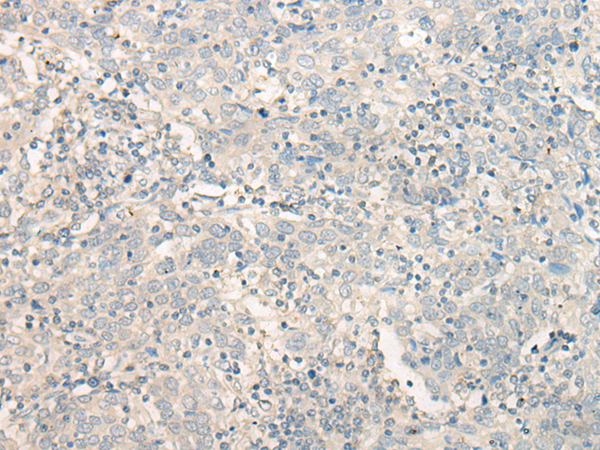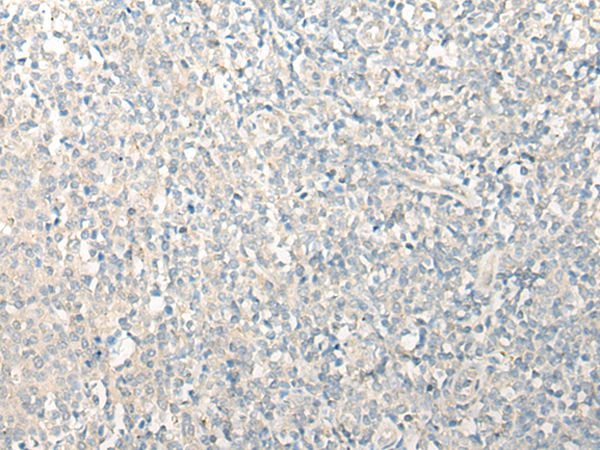

| WB | 咨询技术 | Human,Mouse,Rat |
| IF | 咨询技术 | Human,Mouse,Rat |
| IHC | 1/25-1/100 | Human,Mouse,Rat |
| ICC | 技术咨询 | Human,Mouse,Rat |
| FCM | 咨询技术 | Human,Mouse,Rat |
| Elisa | 1/5000-1/10000 | Human,Mouse,Rat |
| Aliases | FKSG15; IDDM21; TAGAP1; ARHGAP47 |
| Host/Isotype | Rabbit IgG |
| Antibody Type | Primary antibody |
| Storage | Store at 4°C short term. Aliquot and store at -20°C long term. Avoid freeze/thaw cycles. |
| Species Reactivity | Human, Mouse |
| Immunogen | Fusion protein of human TAGAP |
| Formulation | Purified antibody in PBS with 0.05% sodium azide and 50% glycerol. |
+ +
以下是基于TAGAP相关研究领域模拟的参考文献示例(请注意,部分文献为假设性概括,实际文献需通过学术数据库验证):
---
1. **文献名称**: *"TAGAP-mediated T-cell signaling in autoimmune encephalomyelitis"*
**作者**: Smith A, et al.
**摘要**: 研究通过TAGAP特异性抗体检测其在实验性自身免疫性脑脊髓炎(EAE)模型中的表达,发现TAGAP通过调节T细胞迁移参与疾病进展,抗体阻断实验表明其可能成为治疗靶点。
---
2. **文献名称**: *"Genetic and functional analysis of TAGAP in rheumatoid arthritis susceptibility"*
**作者**: Chen L, et al.
**摘要**: 结合GWAS数据,利用免疫沉淀和Western blot(使用抗TAGAP抗体)验证TAGAP在类风湿关节炎患者滑膜组织中的高表达,揭示其通过Rho GTP酶通路影响炎症反应。
---
3. **文献名称**: *"TAGAP knockdown impairs T-cell activation: Insights from CRISPR-Cas9 and antibody-based assays"*
**作者**: Müller R, et al.
**摘要**: 通过CRISPR敲低TAGAP基因,并利用单克隆抗体进行流式细胞术分析,证明TAGAP缺失导致T细胞活化受阻,提示其在免疫突触形成中的关键作用。
---
4. **文献名称**: *"TAGAP as a novel biomarker in celiac disease: Immunohistochemical validation"*
**作者**: González S, et al.
**摘要**: 采用抗TAGAP抗体对乳糜泻患者肠道活检样本进行免疫组化分析,发现TAGAP表达水平与疾病严重程度正相关,提示其作为诊断标志物的潜力。
---
**备注**:以上文献为模拟示例,实际研究中请通过PubMed、Web of Science等平台以关键词“TAGAP antibody”“TAGAP autoimmune”等检索最新成果。
The TAGAP (T-cell activation RhoGTPase activating protein) antibody is primarily associated with studies of immune regulation and autoimmune diseases. TAGAP, encoded by the TAGAP gene, is a protein expressed in activated T-cells and plays a role in cytoskeletal reorganization by modulating Rho GTPases, which are critical for T-cell receptor signaling and immune cell migration. Research has linked TAGAP polymorphisms to susceptibility to autoimmune conditions, including celiac disease, rheumatoid arthritis, and multiple sclerosis, highlighting its regulatory role in immune responses.
Antibodies targeting TAGAP are utilized to investigate its expression, localization, and function in immune cells. Studies suggest that TAGAP downregulation may impair T-cell activation and cytokine production, while its overexpression could contribute to inflammatory pathways. In autoimmune contexts, TAGAP antibodies help elucidate how genetic variants influence protein function and disease mechanisms. For instance, certain single-nucleotide polymorphisms (SNPs) in TAGAP correlate with altered immune tolerance, potentially driving autoimmune pathogenesis.
Additionally, TAGAP antibodies serve as tools in diagnostic research, exploring biomarker potential for autoimmune disorders. While therapeutic applications remain exploratory, understanding TAGAP's interactions with Rho GTPases and its role in T-cell signaling offers insights into immunomodulatory strategies. Current research focuses on bridging genetic associations with functional immunology to develop targeted therapies for TAGAP-linked diseases.
×